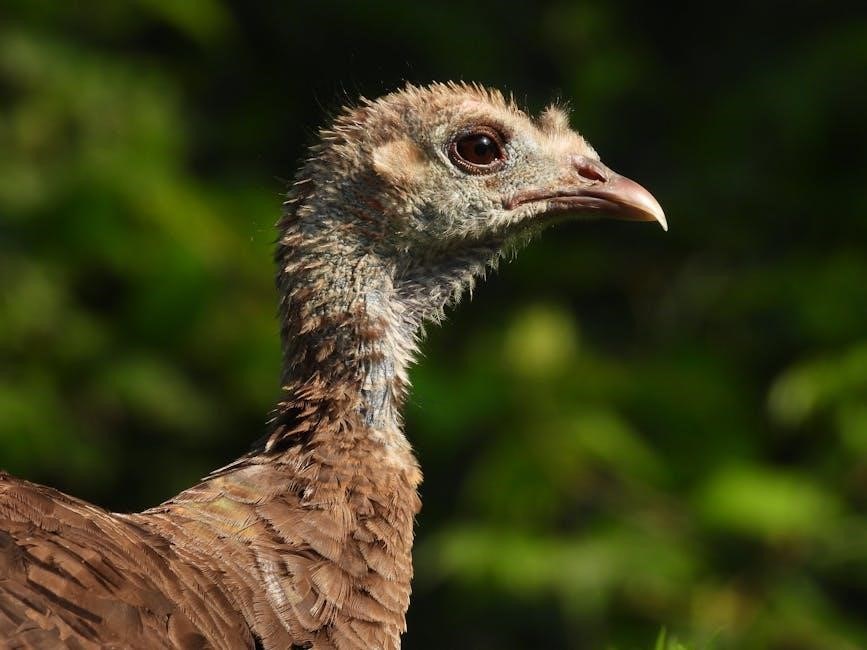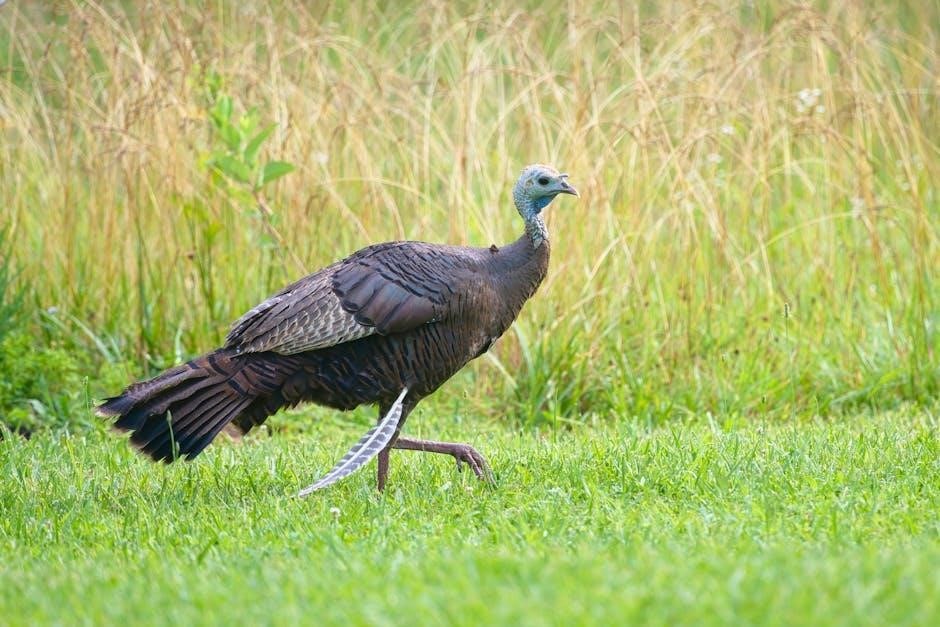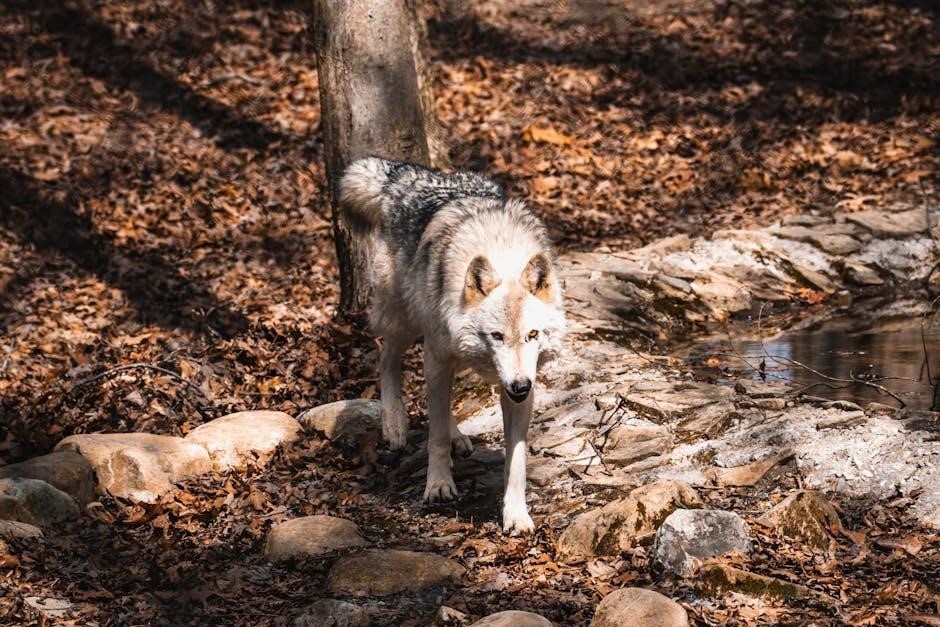tennessee turkey hunting guides
Tennessee turkey hunting guides offer expert knowledge, guided tours, and equipment, ensuring memorable experiences in the state’s renowned hunting regions, perfect for both seasoned hunters and beginners.
Overview of Turkey Hunting in Tennessee
Tennessee is renowned for its abundant wild turkey population, offering hunters diverse landscapes from rolling hills to dense forests. The state’s spring turkey hunting season is particularly popular, attracting both locals and out-of-state hunters. Public lands, such as those in the Appalachian Mountains, provide ample opportunities for pursuing gobblers. Hunters can expect thrilling experiences, as Tennessee’s wild turkeys are known for their strong gobbling activity during mating season. With its rich natural beauty and thriving wildlife, Tennessee remains a top destination for turkey hunting enthusiasts, ensuring unforgettable adventures in the great outdoors.
Importance of Hiring a Guide for Successful Hunts
Hiring a guide is crucial for a successful turkey hunting experience in Tennessee. Guides offer extensive local knowledge, ensuring hunters access prime locations and timing. Their expertise in turkey behavior and calling techniques enhances the likelihood of a fruitful hunt. Additionally, guides provide essential equipment, saving hunters the hassle of bringing their own. They also ensure adherence to safety and ethical hunting practices, promoting responsible wildlife management. For both novices and seasoned hunters, a guide’s insight and support can make the difference between a disappointing outing and a memorable adventure.
What to Expect from Professional Turkey Hunting Guides
Professional Tennessee turkey hunting guides provide unparalleled expertise, ensuring a seamless and productive hunting experience. They offer in-depth knowledge of local habitats, turkey behavior, and seasonal patterns, maximizing the chances of a successful hunt. Guides typically handle logistics, including scouting, setting up decoys, and calling birds. They also provide high-quality equipment and share proven strategies for attracting turkeys. Additionally, guides offer personalized instruction, helping hunters refine their skills in calling, concealment, and shot placement. Their focus on safety, ethics, and conservation ensures a responsible and enjoyable hunt. With their guidance, hunters can expect a well-organized, stress-free adventure tailored to their skill level and preferences.

Regulations and Licensing for Turkey Hunting in Tennessee
Tennessee’s turkey hunting regulations are managed by the TWRA, requiring proper licenses, adhering to seasonal dates, and respecting bag limits to ensure sustainable hunting practices.
Tennessee Wildlife Resources Agency (TWRA) Regulations
The Tennessee Wildlife Resources Agency (TWRA) oversees turkey hunting regulations to conserve wildlife and ensure sustainable hunting. The TWRA sets season dates, bag limits, and legal hunting hours, while enforcing ethical practices. Hunters must obtain the appropriate licenses, including a valid Tennessee hunting license and turkey permit. The agency also mandates hunter education courses for first-time hunters. Specific rules govern the use of calls, decoys, and firearms, with strict penalties for violations. Public land hunters may need additional permits, and private land hunters must have property owner permission. These regulations aim to balance hunting opportunities with wildlife conservation and habitat protection.
Licensing Requirements for Hunters
Hunters in Tennessee must meet specific licensing requirements to legally hunt turkeys. A valid Tennessee hunting license is mandatory, and turkey hunting requires an additional turkey permit. Residents and non-residents can purchase licenses through the TWRA website or authorized vendors. Youth hunters under 16 need a junior hunting license, while seniors may qualify for discounted rates. First-time hunters must complete a hunter education course approved by the TWRA. Non-residents should check reciprocal licensing agreements if applicable. A Habitat Conservation License is also required for all hunters, supporting wildlife conservation efforts. These licensing requirements ensure compliance with state regulations and contribute to sustainable hunting practices in Tennessee.
Season Dates and Bag Limits
Tennessee turkey hunting seasons are carefully regulated to ensure sustainable hunting practices. The spring turkey season typically begins in late March or early April and lasts for several weeks, offering ample opportunities for hunters. Bag limits are set to maintain healthy turkey populations, with hunters allowed to harvest a maximum of two male turkeys per season. Additionally, only one turkey can be taken per day to prevent overharvesting. The Tennessee Wildlife Resources Agency (TWRA) provides detailed season dates and bag limits annually, ensuring hunters stay informed. Adhering to these regulations is crucial for maintaining the balance of turkey populations and preserving the sport for future generations.

Tennessee Turkey Hunting Guides: What They Offer
Tennessee turkey hunting guides provide expert knowledge, pre-scouted locations, and customized hunting plans, ensuring a memorable experience with experienced guides and high success rates.
Expert Knowledge of Turkey Behavior and Habitat
Tennessee turkey hunting guides possess in-depth knowledge of turkey behavior, habitat preferences, and seasonal patterns. They understand the movements of wild turkeys, including roosting areas, feeding grounds, and breeding sites. Guides are skilled in identifying ideal habitats such as wooded areas, open fields, and water sources, ensuring hunters are positioned strategically. Their expertise allows them to predict turkey activity, increasing the chances of a successful hunt. By leveraging years of experience and local insights, guides provide valuable tips on calling, decoy placement, and stalking, making them indispensable for both novice and experienced hunters seeking to maximize their time in the field.
Guided Tours and Customized Hunting Plans
Tennessee turkey hunting guides offer tailored tours and personalized hunting strategies to suit individual preferences and skill levels. They provide pre-scouted locations, ensuring hunters are in prime areas for turkey activity. Customized plans often include early morning setups, mid-day strategies, and late afternoon ambushes, maximizing hunting opportunities. Guides adapt their tactics based on turkey behavior, weather conditions, and time of day. Whether focusing on public lands or private properties, they ensure a well-organized and efficient hunt. This approach not only enhances the chances of success but also creates a memorable and enjoyable experience for hunters of all experience levels.
Equipment and Gear Provided by Guides
Tennessee turkey hunting guides typically provide essential equipment, including high-quality shotguns, ammunition, and an array of calls such as box, slate, and diaphragm calls. They also supply realistic decoys to attract gobblers effectively. Comfort and concealment are prioritized, with camouflage apparel, turkey vests, and blinds often included. Guides ensure all gear is well-maintained and suited for the hunting conditions. This comprehensive support allows hunters to focus on the hunt without worrying about equipment, making the experience more enjoyable and increasing the chances of success. The gear is strategically set up in pre-scouted locations, ensuring hunters are prepared for action.

Best Locations for Turkey Hunting in Tennessee
Tennessee offers diverse habitats for turkey hunting, including public lands, wildlife management areas, and private farms. Popular regions like Cades Cove and the Appalachian Mountains attract hunters annually.
Public Lands and Wildlife Management Areas
Tennessee’s public lands and wildlife management areas provide exceptional opportunities for turkey hunting. Cades Cove, part of the Great Smoky Mountains National Park, is renowned for its abundant turkey population. The Cherokee National Forest and Tennessee National Wildlife Refuge also offer vast, well-managed habitats. These areas are characterized by diverse landscapes, from dense forests to open meadows, creating ideal environments for wild turkeys. Hunters can enjoy accessible trails and scenic vistas while pursuing their prey. The Tennessee Wildlife Resources Agency (TWRA) ensures sustainable hunting practices through regulated seasons and bag limits. Public lands are a prime choice for both novice and experienced hunters seeking an authentic outdoor experience.
Private Lands and Hunting Farms
Private lands and hunting farms in Tennessee offer exclusive turkey hunting opportunities, often with well-managed habitats and abundant turkey populations. These properties are typically maintained by experienced outfitters who provide guided tours and ensure a high success rate. Many farms cater to both novice and seasoned hunters, offering personalized hunting plans and access to prime locations. Private lands often feature diverse terrain, from wooded areas to open fields, creating ideal conditions for turkey hunting. Hunters can benefit from the expertise of local guides, who know the land and turkey behavior intimately. These private settings also emphasize safety and ethical hunting practices, making them a preferred choice for those seeking a tailored and immersive hunting experience.
Popular Regions for Turkey Hunting
Tennessee boasts diverse regions renowned for turkey hunting, each offering unique landscapes and abundant wildlife. The Appalachian Mountains provide expansive public lands with rich turkey populations, while areas like Cades Cove attract hunters with its scenic beauty and active wildlife. Private farms across the state are equally popular, offering managed habitats and guided hunts. Regions such as the Cumberland Plateau and the Mississippi River Valley are also favored for their fertile grounds and thriving turkey populations. These areas cater to both experienced hunters and newcomers, ensuring a memorable and productive hunting experience amidst Tennessee’s natural splendor.
Tactics and Strategies for Successful Turkey Hunts
Effective turkey hunting requires a combination of calling techniques, decoy placement, and camouflage. Hunters must remain patient, timing their approaches during peak gobbling hours for optimal success. Seasoned guides emphasize the importance of understanding turkey behavior and adapting strategies based on weather and terrain conditions to increase the chances of a successful hunt.
Calling Techniques for Attracting Turkeys
Mastering calling techniques is essential for attracting turkeys in Tennessee. Guides often use box, slate, and diaphragm calls to mimic hen turkeys, drawing gobblers into range; Timing is crucial—calling during peak gobbling hours in the morning and midday increases success. Expert guides teach hunters how to vary pitch and tone to simulate realistic turkey communication, building excitement and curiosity among birds. Patience is key, as turkeys may respond slowly, especially in pressured areas. Guides also emphasize understanding when to call aggressively versus subtly, adapting to the turkey’s mood and environment. Proper calling strategies, combined with decoy placement, significantly enhance hunting success in Tennessee’s diverse turkey habitats.
Using Decoys Effectively
Using decoys effectively is a cornerstone of successful turkey hunting in Tennessee. Guides recommend setting up realistic decoy spreads that mimic hens and toms to attract gobblers. Positioning decoys in open areas, such as fields or meadows, ensures visibility and draws curious birds. Feather detail and natural movement are critical for realism. Guides often place hen decoys in feeding positions and tom decoys in strutting poses to create a believable scene. Decoy placement should align with the hunting location and turkey behavior. Seasoned guides adjust decoy setups based on the time of day and turkey activity, ensuring a compelling presentation that lures birds into range. Proper decoy strategy enhances hunting success and creates dynamic interactions with wildlife.
Camouflage and Concealment Tips
Camouflage and concealment are vital for successful turkey hunting in Tennessee. Guides emphasize blending seamlessly into the environment to avoid detection. Hunters should wear full camouflage gear, including suits, hats, and face paint, to match the surroundings. Staying motionless and using natural cover like trees or rocks is crucial. Guides often recommend setting up in shaded areas or against tree trunks to remain hidden. Additionally, avoiding shiny objects and minimizing movement helps maintain concealment. Seasoned guides also advise using ground blinds or tree stands strategically positioned to stay hidden while maintaining a clear line of sight. Proper camouflage ensures hunters remain undetected, increasing the likelihood of a successful hunt.
Timing Strategies for Morning and Afternoon Hunts
Timing is crucial for successful turkey hunting in Tennessee. Morning hunts typically begin at sunrise, as turkeys are most active during early hours. Guides recommend setting up near roosting areas to intercept gobblers as they descend. Afternoon hunts require a different approach, as turkeys tend to be less vocal and more scattered. Guides suggest focusing on feeding areas and water sources during midday, when turkeys regroup. Patience is key during afternoon hunts, as turkeys may not respond to calls as readily. Timing strategies vary by season and weather conditions, but experienced guides adjust plans to maximize opportunities for both morning and afternoon success.

Essential Gear for Turkey Hunting
Quality shotguns, specialized ammunition, reliable calls, decoys, and camouflage are vital for success. A well-equipped hunter ensures better chances of attracting and harvesting turkeys effectively in Tennessee.
Best Shotguns and Ammunition for Turkey Hunting
For turkey hunting, a 12-gauge shotgun is the most popular choice due to its power and range. Models like the Remington 870 and Mossberg 500 are favorites among hunters. When it comes to ammunition, high-quality turkey loads with shot sizes like #4, #5, or #6 are recommended for their dense patterns and effective range. Choosing the right choke, such as a tight turkey choke, ensures tighter shot patterns at longer distances. Properly matching your shotgun and ammunition is crucial for accuracy and ethical harvesting. Investing in reliable gear enhances your hunting experience and increases success rates in Tennessee’s turkey hunting grounds.
Choosing the Right Calls and Decoys
Selecting the right calls and decoys is critical for successful turkey hunting in Tennessee. Box calls, slate calls, and mouth calls are popular choices, each offering unique advantages. Box calls are user-friendly and produce loud, clear sounds, while slate calls allow for precise tone control. Mouth calls are ideal for experienced hunters seeking realistic turkey vocalizations. Decoys, such as hen, jake, and strutter decoys, should be placed strategically to mimic turkey behavior. Realistic designs and natural movements enhance their effectiveness. Combining high-quality calls with well-placed decoys creates an irresistible setup for attracting turkeys. Investing in durable, weather-resistant options ensures reliability during hunts. This combination elevates your hunting strategy and increases chances of success in Tennessee’s turkey-rich habitats.
Hunting Apparel and Accessories
Proper hunting apparel and accessories are essential for a successful turkey hunt in Tennessee. Camouflage clothing, including jackets, pants, and hats, helps hunters blend into their surroundings. Comfortable, moisture-wicking fabrics are ideal for long hours in the field. Waterproof gear is recommended due to Tennessee’s unpredictable spring weather. A good pair of durable, waterproof boots is crucial for navigating rugged terrain. Accessories like gloves, facemasks, and eye protection enhance concealment and safety. Additionally, a turkey vest can carry essentials like calls, decoys, and snacks. Investing in high-quality, functional apparel ensures comfort and readiness for the challenges of turkey hunting in Tennessee’s diverse landscapes.
Safety and Ethics in Turkey Hunting
Practicing safe firearm handling and wearing blaze orange ensures visibility, reducing accidents. Ethical hunting involves respecting wildlife, following regulations, and promoting sustainable hunting practices to conserve turkey populations responsibly.
Safe Hunting Practices and Firearms Safety
Safe hunting involves wearing blaze orange to enhance visibility, ensuring responsible firearm handling, and maintaining situational awareness. Hunters must follow all local regulations, keep firearms pointed away from others, and only shoot when they are certain of their target. Proper training and pre-hunt checks are essential to prevent accidents. Ethical practices include respecting wildlife, avoiding overhunting, and adhering to conservation guidelines. These measures ensure a safe and sustainable hunting experience for everyone involved, fostering a positive environment for both guides and hunters in Tennessee’s turkey hunting scenes. Always prioritize safety to protect people, wildlife, and the environment.
Environmental Ethics and Conservation
Environmental ethics play a crucial role in Tennessee turkey hunting, emphasizing habitat preservation and sustainable practices. Guides promote responsible hunting, ensuring minimal impact on ecosystems and wildlife. Conservation efforts, such as regulated season dates and bag limits, help maintain healthy turkey populations. Ethical hunting practices, including proper field dressing and waste disposal, are encouraged to respect the environment. Hunters are educated on the importance of preserving natural habitats and adhering to wildlife management regulations. By prioritizing conservation, Tennessee turkey hunting guides contribute to the long-term sustainability of wild turkey populations and the state’s rich outdoor heritage, fostering a balance between recreation and environmental stewardship.

Tips for Beginners and Experienced Hunters
Tennessee turkey hunting guides offer tailored strategies for all skill levels, ensuring beginners master basics while experienced hunters refine advanced techniques for successful and memorable hunts.
Advice for First-Time Turkey Hunters
For first-time turkey hunters, practicing calls and understanding turkey behavior is crucial. Start with basic equipment like a reliable shotgun and turkey vest. Learn to identify gobbling patterns and timing strategies, such as mid-morning hunting. Hire an experienced guide to gain insights and improve success rates. Familiarize yourself with local regulations and safety practices to ensure a legal and ethical hunt. Be patient and stay concealed, as turkeys have keen eyesight. Begin in areas with high turkey activity, like public lands or guided farms. Remember, persistence and proper technique lead to memorable hunting experiences in Tennessee’s scenic turkey habitats.
Advanced Techniques for Seasoned Hunters
Seasoned hunters can refine their skills by mastering advanced calling techniques, such as mimicking hen turkey vocalizations and experimenting with decoy setups. Understanding turkey behavior patterns, like mid-morning gobbling and roosting habits, can enhance hunting success. Experienced hunters should adapt strategies based on terrain, weather, and turkey activity. Using high-quality equipment, such as custom calls and realistic decoys, can make a significant difference. Additionally, seasoned hunters should focus on timing, employing passive tactics during mid-afternoon lulls and aggressive strategies during peak activity. Staying physically conditioned and mentally focused ensures readiness for challenging hunts. These advanced techniques, combined with local guide expertise, can elevate your turkey hunting experience in Tennessee’s diverse habitats.
Planning Your Hunt with a Guide
Planning your hunt with a guide involves researching, choosing the right service, and preparing physically and mentally. Discuss strategies, ensure proper gear, and timings for a successful experience in Tennessee;
How to Choose the Right Guide Service
Choosing the right guide service involves researching their experience, reputation, and certifications. Look for reviews and ask for referrals from other hunters. Ensure they have extensive local knowledge and a proven track record of success. Verify their safety standards and certifications, such as those from the Tennessee Wildlife Resources Agency. Opt for guides who offer customized hunting plans tailored to your skill level and preferences. Clear communication about costs, gear, and expectations is essential. Additionally, consider their availability during peak hunting seasons and their ability to adapt to varying hunting conditions. A reputable guide service will prioritize your safety and ensure a memorable hunting experience in Tennessee.
Preparing for the Hunt: Physical and Mental Readiness
Physical and mental readiness is crucial for a successful turkey hunt. Start with conditioning exercises to build stamina and strength, as Tennessee’s terrain can be challenging. Practice carrying gear and hiking in hilly areas to prepare for the physical demands. Mentally, focus on patience and concentration, as turkey hunting requires long periods of stillness and attention. Visualize scenarios to stay calm under pressure. Familiarize yourself with your equipment to avoid mistakes during the hunt. Additionally, study turkey behavior and calling techniques to stay mentally sharp. A well-prepared hunter, both physically and mentally, is more likely to enjoy a rewarding and successful experience in Tennessee’s turkey hunting grounds.
Tennessee turkey hunting guides provide unparalleled expertise, ensuring unforgettable adventures. Plan your next hunt, embrace the state’s rich wildlife, and create lasting memories in its stunning landscapes.
Final Thoughts on Tennessee Turkey Hunting Guides
Tennessee turkey hunting guides are indispensable for both novice and experienced hunters, offering unparalleled expertise and access to prime hunting locations. Their deep knowledge of turkey behavior, habitat, and local regulations ensures a memorable and successful hunting experience. From the rolling hills of Cades Cove to the vast Appalachian Mountains, these guides provide customized plans tailored to individual preferences. Whether you’re seeking the thrill of calling in a gobbling tom or the tranquility of a morning hunt, Tennessee’s guides deliver exceptional service, ensuring your time in the field is both productive and enjoyable. Their dedication to conservation and ethical hunting practices further enhances the overall experience, making them a vital resource for any hunter.
Encouragement to Plan Your Next Hunt
Planning your next turkey hunt in Tennessee promises an unforgettable adventure, with guides offering expert strategies and access to prime hunting locations. The state’s diverse landscapes, from the Appalachian Mountains to rolling farmlands, provide endless opportunities to connect with nature and test your skills. Whether you’re a seasoned hunter or a first-timer, Tennessee’s guides ensure a seamless experience, handling logistics and maximizing your chances of success. Don’t miss the chance to immerse yourself in the thrill of turkey hunting—book a guide today and prepare for an exciting journey into Tennessee’s wild, where every hunt is a memory in the making.
